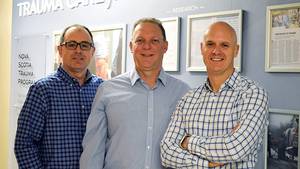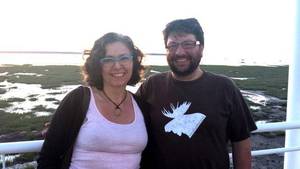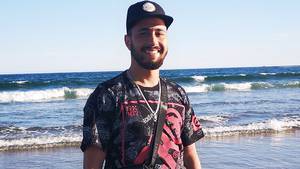Marina Bondar had to abandon her career as a general construction engineer in 1997, when she decided to move across the world, from Kazakhstan to Mississauga, Ontario. After test-driving various jobs, Marina found herself in Nova Scotia, with her husband, in spring 2010. Despite her hardships since the move to Canada, Marina was finding happiness in her new job at a hotel in downtown Halifax and new life in Nova Scotia.
“I loved my job, but I noticed I was getting tired all the time,” she says. “In June last year I started having to clear my throat a lot and I was having a hard time swallowing. I knew something was wrong.”
It was a CT scan at the QEII Health Sciences Centre that revealed the nature of her illness: stage four lung cancer.
“It was a big shock,” she says. “I kept it secret. I didn’t even tell my mother.”
With her symptoms escalating, Marina had to quit her job. The cancer spread to her lymph nodes, and, in October, she had surgery to drain fluid from around her heart, followed by a second surgery to remove tissue.
She was scheduled for chemotherapy when the QEII Health Sciences Centre’s Medical Oncologist, Dr. Stephanie Snow, discovered a new solution.
“It was good news,” says Marina. “She told me that I had a gene mutation and that there’s a great new medication with less side effects that she wanted me to start as soon as possible.”
Atlantic Canadians can also celebrate the good news. In fall 2012, the Lung Cancer Molecular Profiling Program for Atlantic Canada was developed by the collaborative lung cancer treatment team at the QEII. The team led by Thoracic Surgeon, Dr. Drew Bethune includes pathologist, Dr. Zhaolin Xu, medical oncologist, Dr. Wojciech Morzycki, and many others. The screening program analyzes non small cell lung cancer patients’ tumours for six different gene mutations. It allows cancer specialists to prescribe an existing drug treatment that targets the mutated gene, stopping the cancer cells from growing and spreading.
The personalized treatment is very different than standard chemotherapy, which doesn’t target the gene and can't distinguish between healthy and cancerous cells, poisoning both. The side-effects associated with standard chemotherapy happen when the treatment impacts the healthy functioning of non-cancerous cells.
“The mutation is the driving force that makes the tumour appear and grow,” explains Dr. Xu. “If you target specific mutations by drugs, the response is good and there are often fewer side-effects.”
Dr. Snow says it’s too early to tell if personalized treatment can improve the prognosis, but she is certain it is improving the quality of life for cancer patients like Marina.
“If we can use the right targeted drug in the right patient with a given mutation, we will most likely extend that patient's survival in addition to improving their quality of life,” says Dr. Snow. “Knowing the genetic profile of a patient's tumor means that you don't have to guess as to what the best first treatment should be.”
Marina recently finished a three-month personalized treatment that uses a specific drug to target her cancer’s specific gene mutation. She says she noticed a marked improvement in her health after two months and her breathlessness lessened considerably. The side-effects she experiences are minimal compared to that of standard chemotherapy.
“Every cancer is different and every patient is different,” says Dr. Snow. “The information made available by molecular profiling allows the oncologist to have better information with which to make recommendations and counsel patients on treatment choices. Its ability to help us pick the best drug in the first line can be invaluable at extending both quantity and quality of time for patients.”
In addition to helping patients like Marina, the Lung Cancer Molecular Profiling Program and this unique treatment are putting a spotlight on the QEII Health Sciences Centre.
Dr. Xu says that Nova Scotia has been a follower, but with the new targeted treatment, the province can be a leader. The program is unique in the country and represents the first testing for multiplex genotyping. While other labs are testing for individual mutations, the QEII program is the first to analyze multiple gene mutations with a single test, making it a tremendously effective tool in the fight against cancer.
Personalized medicine also has the potential to lower health care costs, says Dr. Xu. Although the drugs used to target specific mutations cost more, their effectiveness could mean fewer people in local hospitals, less money spent on toxic medication, and less demand for drugs to treat the side-effects of standard chemotherapy.
“It represents a new era in cancer management,” says Dr. Xu. “We’re very proud of it. We’re also receiving strong support from all areas, including the hospital, faculty, the Department of Pathology, pharmaceutical partners, and the National Research Council. This enables us to keep the ball rolling and continue our work.”
Marina is getting back on track with her former lifestyle, enjoying short walks outdoors and planning to return to work later this year. She has also started making plans to return to Ontario to be closer to her daughter and newborn grandson. Despite experiencing slight dizziness and pain in her arms, she considers herself lucky.
“I was ready to die,” she says, of her thoughts when diagnosed last summer. “I thought I would live for five or six months. Now I have hope.”







